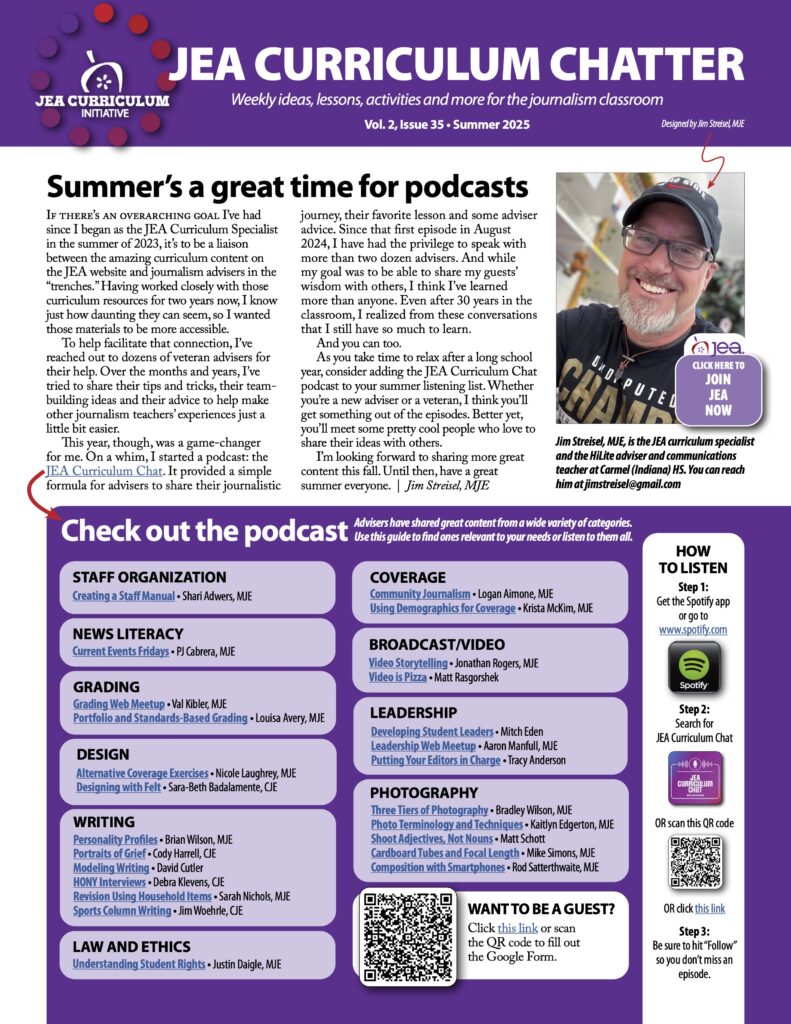Curriculum Library
The JEA Curriculum Initiative shares lesson plans across 11 different content areas, complete with learning outcomes, assessments, evaluation guides, models and alignment to standards including the Common Core and Partnership for 21st Century Skills. Today, we proudly offer hundreds of weeks worth of lessons to complement high school journalism classrooms across the country. This content is available exclusively to all JEA members.
There are many free resources available to the public on the Anywhere JEA page, and some other curriculum falls into groups easily navigated using Curriculum Maps.
Additionally, you'll find a helpful guide to the curriculum library HERE organized by category and lesson order.
Thank you for checking out the JEA curriculum library. JEA updated our website Sept. 11. We appreciate your patience as our curriculum team continues to update links to some of the downloads and activities throughout the library in the coming weeks.
Questions or concerns? Email JEA Curriculum Specialist Jim Streisel directly, or, more broadly, email staff@jea.org the name of the lesson (include the URL) you are trying to access as we may be able to send it to you directly.
Free
Weekly Lesson
Each week, we share a free curriculum lesson on a timely topic. These lessons are free to everyone for a limited period of time. After that, the lessons live in the curriculum library which is accessible only to JEA members. Click here to learn more about membership.
Featuring underrepresented students in the yearbook
Feature Pages and Feature Sections provide contemporary and meaningful forums to include personal coverage and varied forms of storytelling in your publication.Curriculum Library
Copyright Basics
This online lesson helps students independently learn the basics of copyright law and the exceptions to it. After a brief tutorial, students will then either draw or create an online infographic explaining what they have learned.Scenarios to Help Teach Law and Ethics Remotely
Topics covered in this lesson include both legal and ethical concerns such as copyright, photo ethics, basic reporting, takedown requests, etc.Re-examining the Student Media Staff Manual
Staff manuals provide student journalists with resources and guidance. Now is the perfect time to evaluate and review your guidelines.Understanding the First Amendment and Student Press Rights
This lesson provides details and background on Freedom of Speech Rights, what rights student journalists generally possess, gives resources for understanding how any local policies affect those rights and supplies scenarios and links for further discussion.The Power of “How” and “Why”: How Curiosity Can Lead to Great Storytelling
In this lesson, students will be encouraged to think of themselves as “explorers of the world” and will consider the value of asking “how” and “why” in an interview.Principles of Design Basics: Middle School
A two day lesson about the basic principles used in arranging elements.Humans of Your School Personality Profile
Students will have an opportunity to practice all aspects of yearbook journalism and to learn the process.Composition for Alignment and Space: Middle School
In this two day activity, students will create a composition to demonstrate principles of alignment and space.Social media + Photography: Middle School
In this two-day lesson, students will be introduced to many issues surrounding social media, technology and photography, including copyright considerations and how to use photography effectively in different social media outlets. Then, students will experiment with using a specific social media outlet.Sports Photos: Middle School
Students will explore websites and YouTube videos for strategies and techniques for taking good sports photos.JEA Curriculum Chat Podcast
Listen to the most recent episode.
About Curriculum & The Team
In May 2013, the Journalism Education Association began work on its curriculum initiative, creating lesson plans across 14 content areas, complete with learning outcomes, assessments, evaluation guides, models and alignment to standards including the Common Core and Partnership for 21st Century Skills.
Over the course of the next 11 months, JEA worked with 14 of its members — identified as national leaders in their area of expertise — to develop nearly 200 weeks worth of lessons to complement high school journalism classrooms across the country. Helping them were dozens of other JEA members, professionals and student journalists who volunteered their own ideas, materials and examples to benefit scholastic media advisers.
As important as this electronic resource is, it’s merely a portion of JEA’s curriculum initiative. Just as important is the ongoing commitment the organization is making to the effort. Curriculum leaders keep the curriculum current and dynamic by providing updated lesson plans and examples that reflect the newest trends and technology. They collaborate with other JEA committees such as certification and Career & Technical Education to ensure that the organization is at the forefront of defining 21st century journalism. They coordinate with our national Professional Advisory Committee to ensure our student learning objectives align with industry standards. They showcase their curriculum and lessons at national conventions and conferences. And they host online chats to not only discuss implementation of their module, but to coordinate discussion of best practices that will guide future development.
We welcome your feedback, suggestions, plaudits and corrections. Please feel free to email mfromm@d51schools.org, or contact specific curriculum leaders directly.

